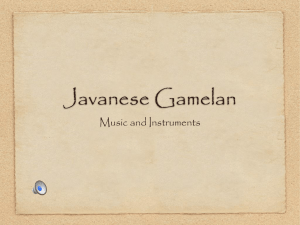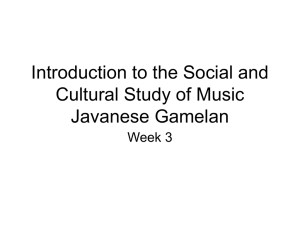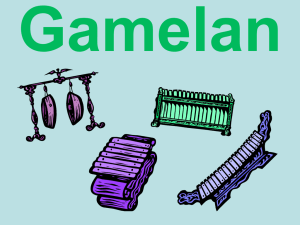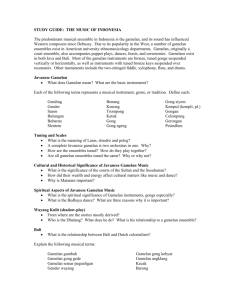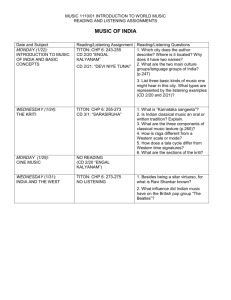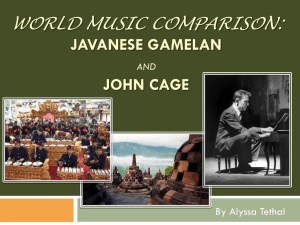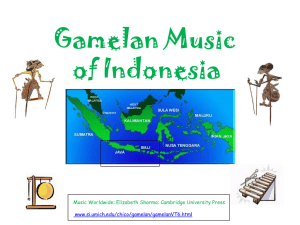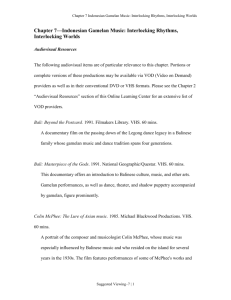Music 254 Studies in World Music
advertisement
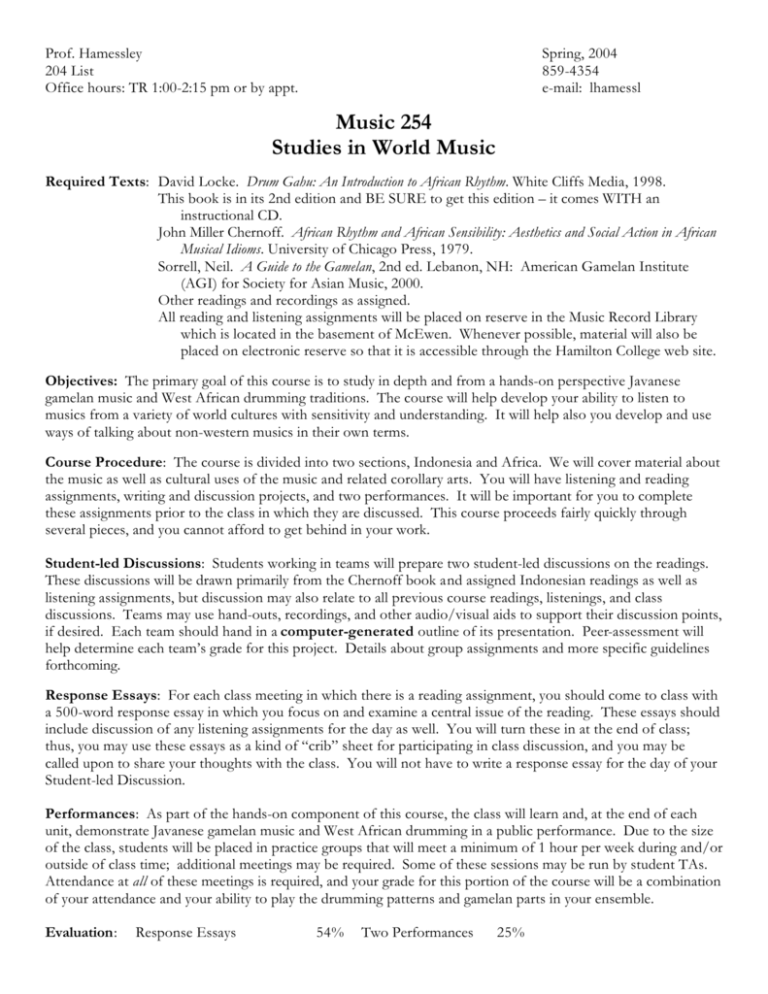
Prof. Hamessley 204 List Office hours: TR 1:00-2:15 pm or by appt. Spring, 2004 859-4354 e-mail: lhamessl Music 254 Studies in World Music Required Texts: David Locke. Drum Gahu: An Introduction to African Rhythm. White Cliffs Media, 1998. This book is in its 2nd edition and BE SURE to get this edition – it comes WITH an instructional CD. John Miller Chernoff. African Rhythm and African Sensibility: Aesthetics and Social Action in African Musical Idioms. University of Chicago Press, 1979. Sorrell, Neil. A Guide to the Gamelan, 2nd ed. Lebanon, NH: American Gamelan Institute (AGI) for Society for Asian Music, 2000. Other readings and recordings as assigned. All reading and listening assignments will be placed on reserve in the Music Record Library which is located in the basement of McEwen. Whenever possible, material will also be placed on electronic reserve so that it is accessible through the Hamilton College web site. Objectives: The primary goal of this course is to study in depth and from a hands-on perspective Javanese gamelan music and West African drumming traditions. The course will help develop your ability to listen to musics from a variety of world cultures with sensitivity and understanding. It will help also you develop and use ways of talking about non-western musics in their own terms. Course Procedure: The course is divided into two sections, Indonesia and Africa. We will cover material about the music as well as cultural uses of the music and related corollary arts. You will have listening and reading assignments, writing and discussion projects, and two performances. It will be important for you to complete these assignments prior to the class in which they are discussed. This course proceeds fairly quickly through several pieces, and you cannot afford to get behind in your work. Student-led Discussions: Students working in teams will prepare two student-led discussions on the readings. These discussions will be drawn primarily from the Chernoff book and assigned Indonesian readings as well as listening assignments, but discussion may also relate to all previous course readings, listenings, and class discussions. Teams may use hand-outs, recordings, and other audio/visual aids to support their discussion points, if desired. Each team should hand in a computer-generated outline of its presentation. Peer-assessment will help determine each team’s grade for this project. Details about group assignments and more specific guidelines forthcoming. Response Essays: For each class meeting in which there is a reading assignment, you should come to class with a 500-word response essay in which you focus on and examine a central issue of the reading. These essays should include discussion of any listening assignments for the day as well. You will turn these in at the end of class; thus, you may use these essays as a kind of “crib” sheet for participating in class discussion, and you may be called upon to share your thoughts with the class. You will not have to write a response essay for the day of your Student-led Discussion. Performances: As part of the hands-on component of this course, the class will learn and, at the end of each unit, demonstrate Javanese gamelan music and West African drumming in a public performance. Due to the size of the class, students will be placed in practice groups that will meet a minimum of 1 hour per week during and/or outside of class time; additional meetings may be required. Some of these sessions may be run by student TAs. Attendance at all of these meetings is required, and your grade for this portion of the course will be a combination of your attendance and your ability to play the drumming patterns and gamelan parts in your ensemble. Evaluation: Response Essays 54% Two Performances 25% 2 Two Student-led Discussions 15% Class Participation 6% 3 Guest Artists and Additional Events: We will have two guest artists joining us this semester, and so there will be several required additional workshops and performances that you will attend – these events are listed in the course schedule. In particular, Joko Sutrisno, a gamelan master from Java, will join us for the week of February 16-20. He will not only be in our classes, but he will meet with small groups of students for additional sessions during that week. So please keep your schedule as open as possible during that time. Musical Instruments & Facilities: We are very lucky to own the African drums and the Javanese gamelan instruments, and I want you to view your access to these instruments as a privilege. Please handle all the instruments with the greatest care and in the manner I describe. You will be liable for any damages to or loss of these instruments that you cause to occur. Only students registered for this course are permitted to play or handle these instruments unless they have specific permission from me. In addition, only students registered for this course are permitted inside the gamelan room. You MAY NOT share your gamelan room code with anyone outside of class. All of our instruments are too costly and difficult to replace for us to take any chances. Attendance: Your presence and participation in class will play a part in your grade, so you will be expected to attend all classes and required additional workshops and performances. You must let me know of any absences due to scheduled sports games by the end of the second week of classes. More than two unexcused absences will have a detrimental effect on your grade. If you are aware of times you will miss for any reason please see me in advance to make arrangements. Otherwise, I will assume that you will be in class. Late assignments: I WILL NOT accept late response papers unless you have made prior arrangements with me by the class preceding the due date of the assignment (the earlier the better). If you cannot attend class due to illness or a previously scheduled sporting event, I will accept a response paper if handed in prior to the class meeting. Exams: Although we do not have a final exam in the course, we have been assigned a time during final weeks: Friday, May 14, 9 am-12 noon. Please keep this time open. We may need to use that time for final projects, performances, and other end-of-semester activities. You should not make plans to leave campus during finals week before this date. Honor Code: All work submitted for a grade in this course must be prepared in accordance with the Hamilton College Honor Code. I encourage you to do your listening assignments together and to discuss the readings. However, your graded work must be your own. It is also an infringement of copyright law and library policy to make copies of any recorded material in the Music Library (all records, CDs, and tapes). I will consider a violation of this policy to be a violation of the Honor Code. Gamelan CD: You will be loaned a CD of gamelan music examples so that you can do that listening in your room rather than the Music Library (though there will be other gamelan listening assignments you’ll have to do in the Music Library). These CDs MUST be returned to me on March 11. I cannot turn in a course grade for you if the CD is not returned in good condition. Office Hours: I have office hours posted for TR 1:30-2:30. If your schedule conflicts with these times, see me to arrange a time that will work for you. Use this time to discuss your discussion group assignments or to clarify any questions or difficulties you are having. 4 Music 254: Studies in World Music Course Schedule & Reading Assignments SECTION 1: INDONESIA — Javanese Gamelan Pieces to be learned in this section: Manyar Sewu Tropongbang T January 20: Reading: Jennifer Lindsay, Javanese Gamelan: Traditional Orchestra of Indonesia. R January 22: In-class workshop with Footworks Percussion Dance Ensemble. Meet in Wellin Hall. Reading: Jeff Todd Titon, et al., Worlds of Music, 4 th ed., pp. 279-298. Listening: Gamelan Examples, CD Tr. 1, 2, 11. Friday, January 23: Saturday, January 24: Workshop with Footworks Percussion Dance Ensemble and StepAfrika! in Solemates. Events Barn, 12:00-12:50pm AND 1-2:15pm. Attendance Required. Footworks Percussion Dance Ensemble and StepAfrika! in Solemates. Wellin Hall, 8pm. Attendance Required. T January 27: Group 1 Reading: Neil Sorrell, A Guide to the Gamelan, 2 nd ed., Chap. 2. Judith Becker, “An Introduction to Gamelan Music,” in Traditional Music in Modern Java, Chap. 1. Listening: Gamelan Examples, CD Tr. 1, 2, 11. R January 29: Reading: Titon, pp. 299-307. Bruno Nettl, et al., Excursions in World Music, 3 rd ed., pp. 143-146. Sorrell, Chap. 3. Listening: Gamelan Examples, CD Tr. 3, 4. T February 3: Group 2 Reading: Becker, “From Oral to Written Tradition in Javanese Music,” in Traditional Music in Modern Java, Chap. 2. Titon, pp. 307-314. Listening: Gamelan Examples, CD Tr. 5 & 6. R February 5: Reading: Sorrell, Chap. 4. T February 10: Group 3 Reading: Becker, “Traditional Kingship, Nationalism and the Gamelan,” in Traditional Music in Modern Java, Chap. 3 Listening: Nettl, pp. 146-151. Listening: Gamelan Examples, CD Tr. 8, 9. R February 12: Reading: Sorrell, Chap. 5. Titon, pp. 314-316. Listening: Gamelan Examples, CD Tr. 7. T February 17: In-class workshop with Joko Sutrisno. Listening: Gamelan Examples, CD Tr. 11. 5 R February 19: In-class workshop with Joko Sutrisno. Listening: Gamelan Examples, CD Tr. 11. T February 24: Group 4 Reading: Mervyn Cooke, “‘The East in the West’: Evocations of the Gamelan in Western Music,” in The Exotic in Western Music, ed. Jonathan Bellman (Boston: Northeastern University Press, 1998): 258-80. Sorrell, Chap. 1 & 6. Listening: M1520 R25 M3 1986: Maurice Ravel, Ma Mere L’oye, “5e Tableau, Laideronnette, Imperatrice des Pagodes,” Tr. 6. M24 D28 S9 K6 1984: Claude Debussy, Estampie, “Pagodes,” Tr. 11. M1500 B86 T9 1990: Benjamin Britten, The Turn of the Screw, CD 2, Tr. 1. On pg. 34-35 of the booklet: Variation VIII/Scene 1 - Colloquy and Soliloquy. Listen through this and note the wash of percussion that accompanies the text “The ceremony of innocence is drowned,” sung by Quint and Miss Jessel on p. 35. Britten uses this “other world” sound to denote that they are ghosts. M21 P4 G7 v. 15 1998: Francis Poulenc, Concerto for Two Pianos in d minor. Trs. 1 & 3. R February 26: Reading: Paul Roberts, “Debussy and the Javanese Gamelan,” in Schwann Opus (Winter, 1996/97): 28A-34A. Listening: Nettl, CD 1, Tr. 24. M3.1 H319 M8 1991: Lou Harrison, Concerto in Slendro, Tr. 1-3; Three Pieces for Gamelan with Soloist, Tr. 4-6. M311 M5 S6 1990: Lou Harrison, Double Concerto for Violin and Cello with Javanese Gamelan, Tr. 1-3. M1495 T8 P6 1994: R. Murray Schafer, Gamelan, performed by Turtle Creek Chorale. Tr. 6. This one uses voices as the gamelan. M1473 B6329 M5 1994: Easley Blackwood, 12 Microtonal Etudes for Electronic Music Media, Op. 28, no. 4 “23 Notes: Allegro Moderato,” Tr. 5. T March 2: Reading: Nettl, pp. 151-157 Carol Oja, “Colin McPhee’s Cross-Cultural Odyssey,” Schwann Opus (Winter, 1996/97): 20A-26A. Listening: Gamelan Examples, CD Tr. 7 & 10. M5 B344 1992, Tr. 1: Jaya semara: pour gamelan gong kebyar (Balinese gamelan music). M5 B344 1992, Trs. 2-4: Colin McPhee, Balinese ceremonial music (for 2 pianos). M5 B344 1992: Bali a Montreal. Sample from this CD. M2 R31 v.430 1993: Sekar Jaya, American works for Balinese gamelan orchestra. Sample from this CD. All pieces written for Balinese gamelan R March 4: Gamelan Practice T March 9: Gamelan Practice R March 11: Gamelan Demonstration SECTION 2: AFRICA — West African Drumming 6 Pieces to be learned in this section: Ewe Drumming: Agbekor & Gahu Kete Drumming: Ohene ko Edwuma T March 30: Reading: W. Komla Amoaku, “Toward a Definition of Traditional African Music: A Look at the Ewe of Ghana,” in Irene V. Jackson, ed., More Than Drumming: Essays on African and Afro-latin American Music and Musicians, 1985: 32-39. Alfred Swashie Ladzekpo and Kobla Ladzekpo, “Anlo Ewe Music in Anyako, Volta Region, Ghana,” in Elizabeth May, ed., Musics of Many Cultures, 1980: 216-231. David Locke, Drum Gahu: An Introduction to African Rhythm, 1998, Chap. 1. Listening: Drum Gahu CD, Track 1. Jeff Todd Titon, Worlds of Music, 4 th ed., CD 1, Track 16. R April 1: Reading: T April 6: Reading: R April 8: Reading: Review material for drumming practice. Listening: Drum Gahu CD, Chap. 3 examples, Tracks 13-30. Titon, Worlds of Music, 4 th ed., CD 1, Track 16. T April 13: Reading: R April 15: Reading: Chernoff, pp. 91-101. Listening: Titon, Worlds of Music, 4 th ed., CD 1, Track 16. T April 20: Reading: R April 22: Reading: Locke, Chap. 4. Listening: Drum Gahu CD, Chap. 4 examples, Tracks 31-66. Titon, Worlds of Music, 4 th ed., CD 1, Track 16. T April 27: Reading: R April 29: Reading: T May 4: Reading: R May 6: Reading: Chernoff, pp. 1-37 (Intro & Chap. 1) Listening: Titon, Worlds of Music, 4 th ed., CD 1, Track 16. Locke, Chap. 2. J. H. Kwabena Nketia, The Music of Africa, 1974, Chaps. 5-7, Chap. 10.* Jeff Todd Titon, Worlds of Music, 4 th ed., Chap. 3, pp. 87-113. Listening: Jeff Todd Titon, Worlds of Music, 4 th ed., CD 1, Tracks 1, 15 & 16. Drum Gahu CD, Chap. 2 examples, Tracks 2-12; 66 & 67. Nketia, Chaps. 2-4.* John Miller Chernoff, African Rhythm and African Sensibility: Aesthetics and Social Action in African Musical Idioms, 1979: 39-57. Locke, Chaps. 3 & 5. Listening: Drum Gahu CD, Chap. 3 examples, Tracks 13-30. Titon, Worlds of Music, 4 th ed., CD 1, Track 16. Chernoff, pp. 57-88, Group 1. Chernoff, pp. 101-117, Group 2. Chernoff, pp. 117-143, Group 3. Chernoff, pp. 143-151. Nketia, Chaps. 18-20.* Listening: Titon, Worlds of Music, 4 th ed., CD 1, Track 16. Chernoff, pp. 154-172, Group 4. Friday, May 7: Drumming Demonstration May 14, 9 am-12 noon: TBA. Keep this day & time open. 7 *J. H. Kwabena Nketia, The Music of Africa, 1974, Chapter Titles: on reverse of page 8 *J. H. Kwabena Nketia, The Music of Africa, 1974, Chapter Titles Chapter 2: “Music in Community Life” Chapter 3: “Performing Groups and Their Music” Chapter 4: “Recruitment and Training of Musicians” Chapter 5: “Instrumental Resources” Chapter 6: “Idiophones” Chapter 7: “Membranophones” Chapter 10: “Organizational of Instrumental Ensembles” Chapter 18: “Interrelations of Music and Dance” Chapter 20: “The Conventions of Musical Practice”
